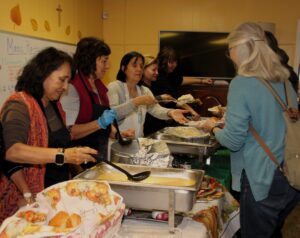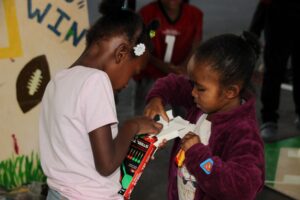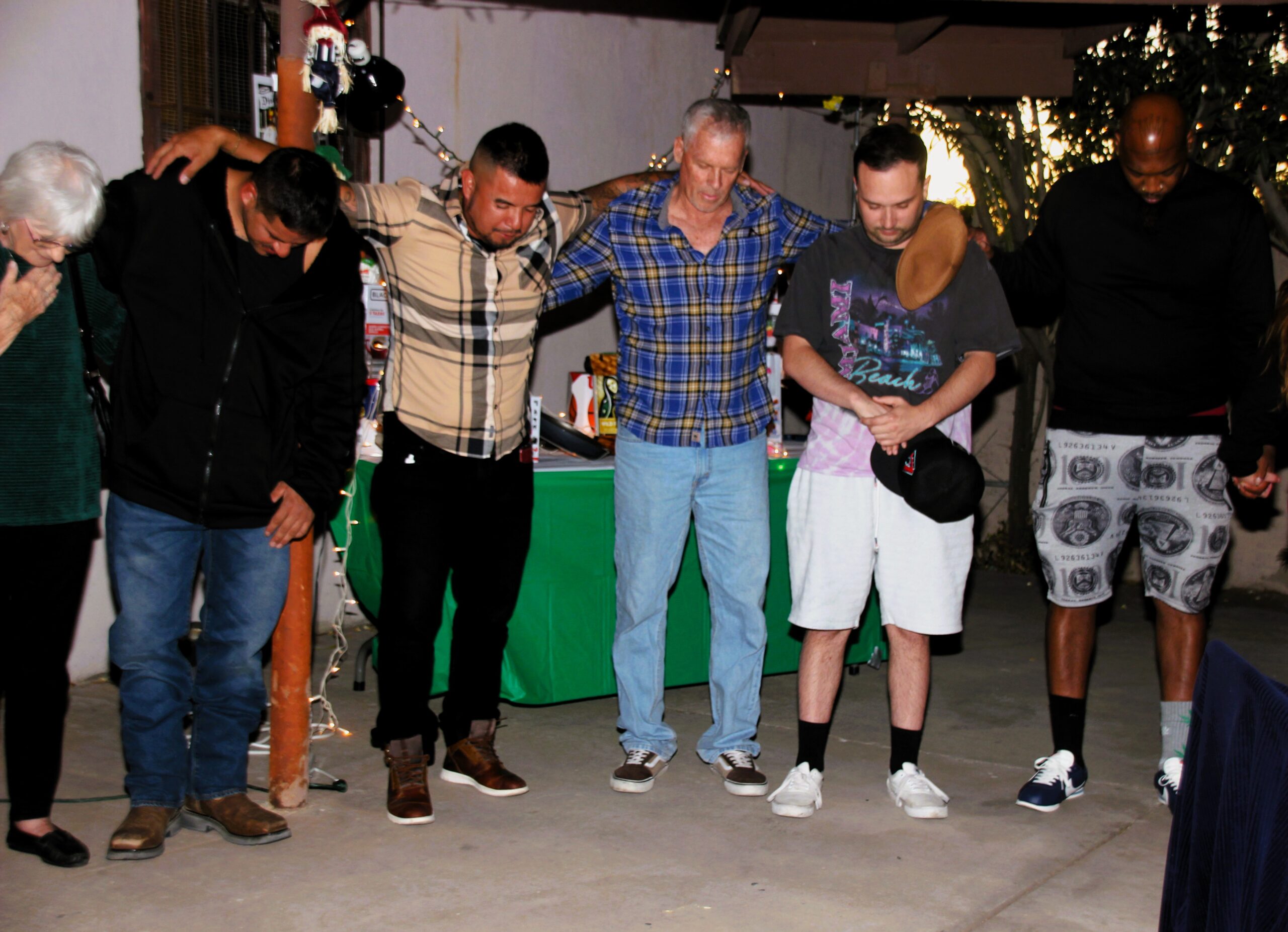PHOENIX — Men from the south-central Phoenix area, including many who have served prison time for criminal offenses, gathered with their families and friends for a final Thanksgiving dinner hosted by the retiring head of the Diocese of Phoenix’s Office of Prison Ministry Tuesday, Nov. 21.

Over 100 individuals dined on turkey, stuffing, cranberry sauce, mashed potatoes, green beans and other dishes served by Kevin Starrs, his wife, Silvia, and more than a dozen volunteers on the patio of St. Josephine Bakhita Mission Parish near downtown Phoenix under the clear, warm November evening. Music filled the air as guests mingled and children played games. Upon arrival, many guests greeted the Starrs with a shout, a wide smile and big hugs.

After 30 years with the ministry, including the last nine as director, Kevin Starrs will be leaving in August 2024 to devote his energy and time to establishing a Catholic-based statewide substance-abuse recovery facility, something he has been working on part time for the past couple years.
He won’t be leaving the relationships, though. “The relationships are going to go on. We’ve known each other for years. We play ball together; go to each others’ houses,” he said.

The Starrs have hosted the dinner for nearly two decades, and while the Diocese is expected to name a new director, dinner participants said it is hard to imagine someone else continuing the tradition.
“Kevin has a whole lineage of people who have been incarcerated, released, (and) become members of society. He has 30 years of institutional knowledge,” said Denis Sheehan, who has volunteered for over 20 years.
“He has a way with (those he serves). The guys absolutely love him — guys you’d be nervous around in a dark alley — these guys are his family,” Sheehan said.
“I consider him like a father figure,” echoed Christopher Lira, 35, of Phoenix.
Lira brought his two daughters and was joined by a brother and other family.
BEGINNINGS
A Los Angeles native, Starrs was the third of 10 children raised in a devout Catholic home. When he was 12, the family moved to the Navajo Indian Reservation in Arizona. His father later became a deacon in the Diocese of Gallup, N.M.
But problems adjusting arose, leading Kevin eventually to seek escape through marijuana.
“We had a loving family. My dad was a good man, but we had some (issues). It was a deep situation. I smoked weed for 10 years,” he recalled. “I needed healing.”
In his mid-20s, Starrs turned to God, a process that began at the Newman Center at Arizona State University in Tempe, where he had graduated. The transformation continued as he attended St. Timothy Parish in Mesa.
“Little by little, I went to God and asked Him to help heal me. It was a slow, long, ongoing process,” he recalled.
The experience, however, would provide Starrs the understanding, empathy and patience needed to minister to young men in trouble.
Starrs left drugs for good and began to serve, first at the Boys and Girls Club, then in 1994 with the Diocese, where he got involved with the Prison Ministry. Participants visit prisons and offer inmates Bible study; prayer; the Liturgy of the Word with the Eucharist; one-to-one mentoring; referrals to agencies for transition back to society, and spousal support.
He also has visited children in juvenile detention.
In the late 1990s, Starrs was ministering to about a dozen minors. As they were released, he would invite them to a youth group at St. Pius X, the mission church that became part of St. Josephine Bakhita Mission Parish after it was established in 2022. Family and neighbors of participants began attending as well.
The Thanksgiving dinner was born out of that gathering.
RELATIONSHIPS THAT WILL GO ON
Lira, who lives in the neighborhood, met Starrs while a teenager. “I didn’t grow up with a father,” he said. “The neighborhood wasn’t good. (There were) drugs, violence.”
Starrs often visited Lira at home, taking him out for a meal or conversation. “He would ask, ‘How’s your day? How was school?’” Lira recalled. When Lira served two years in prison for weapons possession, Starrs continued to see him behind bars. “He always stayed positive. He encouraged me to keep pushing forward. “He said, ‘You’ve got your kids to think about. You’re a good kid,’” Lira remembered. Now a roofer with a Phoenix company, Lira has come often to the annual Thanksgiving dinner.
His brother, Margaro Lira, 38, also has been a regular. Having known Starrs since age 11, Margaro Lira also credits him with helping get his life on track after prison.
“He kept coming to visit us. He would come with his Bible. He planted the seeds, you know?” he said.
Margaro Lira now serves with Starrs in the prison ministry and plans to help him establish the rehab center. “It’s about giving back,” he said.
Such transformation is the product of strong relationships. “The LORD touched me deeply,” Starrs said. “I wanted to give back (to others). The only way I know how to do that is (through) relationships. “These guys care about hearing about God, but it’s our relationship that shows God’s love,” he said.
Sheehan agreed. “Most of them are just scared kids. It starts with nonjudgment, the love of Jesus, standing here and saying, ‘I’m here for you.’”
The Starrs said they have been blessed by not only helping troubled individuals but growing friendships with them.
“Being here tonight is very important because I get to see most of them at the same time, not just one-on-one or at a women’s group,” said Silvia Starrs. “It touches my heart to see them, enjoy each other and enjoy us. They’re very hard workers. The majority are doing really well. It gives me a lot of hope to see them become responsible adults and love God,” she continued.
“It’s worth it all.”







